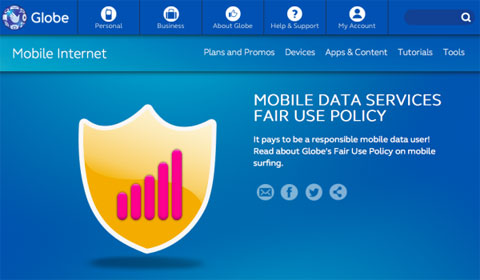The Internet has changed the way we live. It has improved the way we communicate with people and how we share information. However, the Internet can also cause problems especially when it is not working as advertised or used as a tool for criminal acts. Filipinos are very familiar with such problems. Here are ten examples to start with, some are mundane while some are serious.

A big check for everyone? Although the state of the Internet in the country is better compared to, let’s say, ten years ago? Our country is still lagging in internet speed and is more expensive compared to other countries in Asia. This has already attracted the attention of our lawmakers and government agencies although I wonder how they are handling it so far.

Majority of Filipinos have smartphones and tablets and they mostly use these mobile devices to access the Internet. In this case, we rely on 3G and 4G LTE networks to stay connected. However, despite telcos advertising that they have the capacity and coverage in major areas, quality is not always consistent. This creates trust issues especially when telcos advertise…

Telcos love using the word “unlimited” or “unli” in their internet promos but we all know that those are not really unlimited by definition. Consume your allocated bandwidth and you’ll be greeted by…

Once you hit data cap, most of the time your internet is practically useless. You can still connect to the internet though but at a very slow speed. The DOJ has recently warned the telcos of imposing FUP on their so-called unlimited internet as it was deemed deceptive and unfair under the Consumer Act.

Hacking is still a prevalent issue not just in powerful countries like the US and China but in developing countries as well like the Philippines. Just this year multiple hackings have been reported in the country claiming to be done by Filipino hackers. These hackers have defaced local government, corporate, and Chinese websites as a way to voice out their concerns. On a larger scale, one of the most recent cases is the hacking of Sony Pictures.

Filipinos are very vocal on the Internet especially when they are anonymous. They voice out almost everything on forums, comments sections, especially in the social media sphere like Facebook and YouTube. Social media is a powerful tool in exposing abusive individuals especially those in power, however, people have also used this as a platform to bully or troll other people. Some examples are the case of “Amalayer” girl Paula Jamie Salvosa and the online mocking of Senator Nancy Binay.

Social media is not really harmful per se. It’s where we get news and updates from our friends, family, and other people around the world. It only becomes an issue when a person becomes addicted to it to the point that it has already affected his/her productivity or real social life.

Admit it, your ego gets hurt a bit when your Facebook, Instagram, and Twitter posts do not get the amount of Likes or engagement that you want. Social media responsible individuals will take this as motivation to improve the quality of their posts like coming up with more engaging topics or better photos to share. Those in the other end of the spectrum will resort to more attention-seeking methods like posting obscene seflies, useless ranting, using at least ten hashtags in one post, sharing disgusting photos, or spreading…

The objective of a hoax is to trick someone into believing something that is not true. Unfortunately, a lot of people still fall for hoax articles nowadays especially when found on social media sites. One example is the one about Facebook planning to charge its users monthly fees to use their services. A hoax can become a serious issue especially when it incites widespread fear and paranoia like the Ebola hoax. The hoax news became too viral that it prompted the DOH to publicly dismiss the report and for Justice Secretary Leila de Lima to warn the public that spreading false information online may land you in jail.

Online scams or internet fraud is an ongoing issue especially in the Philippines. These criminals are simply out there to get your money and they have increasingly become more creative in doing so (like our corrupt government officials). There are the emails that claim to be from a royal family in Africa letting you know that you have inherited their fortune, fake online merchants that disappear after you send them payment, fake lovers in social media sites, and online sextortion syndicates.

YugaTech.com is the largest and longest-running technology site in the Philippines. Originally established in October 2002, the site was transformed into a full-fledged technology platform in 2005.
How to transfer, withdraw money from PayPal to GCash
Prices of Starlink satellite in the Philippines
Install Google GBox to Huawei smartphones
Pag-IBIG MP2 online application
How to check PhilHealth contributions online
How to find your SIM card serial number
Globe, PLDT, Converge, Sky: Unli fiber internet plans compared
10 biggest games in the Google Play Store
LTO periodic medical exam for 10-year licenses
Netflix codes to unlock hidden TV shows, movies
Apple, Asus, Cherry Mobile, Huawei, LG, Nokia, Oppo, Samsung, Sony, Vivo, Xiaomi, Lenovo, Infinix Mobile, Pocophone, Honor, iPhone, OnePlus, Tecno, Realme, HTC, Gionee, Kata, IQ00, Redmi, Razer, CloudFone, Motorola, Panasonic, TCL, Wiko
Best Android smartphones between PHP 20,000 - 25,000
Smartphones under PHP 10,000 in the Philippines
Smartphones under PHP 12K Philippines
Best smartphones for kids under PHP 7,000
Smartphones under PHP 15,000 in the Philippines
Best Android smartphones between PHP 15,000 - 20,000
Smartphones under PHP 20,000 in the Philippines
Most affordable 5G phones in the Philippines under PHP 20K
5G smartphones in the Philippines under PHP 16K
Smartphone pricelist Philippines 2024
Smartphone pricelist Philippines 2023
Smartphone pricelist Philippines 2022
Smartphone pricelist Philippines 2021
Smartphone pricelist Philippines 2020
Easy E says:
wow sa “troll”. Most of us doesn’t realize ourselves trolling yuga. But things has to be said. And there are others who provokes us to unleash our trolling expertise (sinasadya kasi nilang maging tanga o nakakainis). LOL.
May gusto lang ako idagdag. yung mga FAME WHORE. Yung mga feeling superstars sa fb/twitter/instagram.
WarrenC. says:
agree with you on the famewhores–ang dami diyan, mga feelingero and feelingera lahat. best way to deal with these f*ckwits is to just ignore them.
plasticnatroll says:
Amplastic mo naman. Bakit di mo basahin yung mga past comments mo? Andaming yuga commenters ang tinotroll at cyberbully mo. Wag kang magmalinis fame whore ka din di ba?
eric jay says:
hoaxes – most filipinos are gullible so they believe those and click and get viruses.lol
ewanlangha says:
my problem is with the server side of things
my speed is ok but the other end is bottled-neck
and has no plans of upgrading
polymi says:
Reklamo, post2x, comment2x… Pagkatapos, dating gawi. Hanggang dun lang kayo. LOL.
Basta Pilipino, puro reklamo.
Ayan… Magrereply na mga yan… LOL.
Xander says:
That’s why the term “netizens” as used by media to refer social media users is becoming questionable. As far as I can see, parang mas maraming trolls or posers ang pala-comment sa mga news fanpages, most of them pa nga, are not reading the news stories but just headlines. Lalo pag news about LGBT. Its like social media has given people the right to abuse other people in many ways while still remaining anonymous.
Agnes says:
The interwebs is not for the weak and dumb. People need to learn to ignore certain things. For every one good information you find, there will always be a million more garbage.
'Em says:
I think majority if not all of us are affected in one way or the other by what’s on 1-4. Yung 5-10, we can go on with our lives without worrying too much on them.
ako ito says:
Yuga boss and colleque…sana guamawa naman kayo nang tips on how to detect hoax posts from twitter, fb, instagram. Thanks.
nameless says:
Simple lang naman ma-detect sila. Use “common sense”. Nakagamit ka na lang din ng internet, kung di ka sigurado sa scam/spam/hoax, gamitin mo yung google.
dense says:
How to detect a hoax? Common sense naman. e di mag search online din. Rely on the trusted sites with good ratings. Bottomline is don’t just believe all posts you see unless it’s verified.
Alex says:
iang LTE nga ng Smart Comm. kay hanggang 4 mbps lng compared to 40 + mbps ng ibang bansa. lol, ang layo naman xD
igniculus says:
I AM A FAMEWHORE.
Athena says:
I hate the slow and expensive part. Truly number 1 problem. They keep on adding new services but never improves the previous ones.